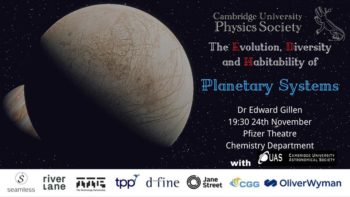Dodaj do kalendarza
Kiedy:
24 listopad 2021@20:30
2021-11-24T20:30:00+01:00
2021-11-24T20:45:00+01:00
Gdzie:
Pfizer Lecture Theatre, Chemistry Department
Kontakt:
CUPS - Cambridge University Physics Society

Title: The evolution, diversity and habitability of planetary systems
—
Abstract:
—
Abstract:
While we have detected over 4000 planets around old main-sequence stars like our Sun, we have only discovered a handful of planetary systems around young stars with ages less than a few hundred million years. These young planetary systems are very important, however, because they directly link our theories of planet formation and early evolution to the older exoplanet population. In doing so, they offer important new insights into some key outstanding questions in exoplanet research, such as: how do planetary systems form and evolve into the diverse population that we observe? And how does early stellar activity affect subsequent planet habitability? I will discuss ongoing efforts to help answer these questions by detecting new young planetary systems and characterizing the variability of young stars.
—
About the speaker:
Dr. Edward Gillen is a Lecturer and Winton Fellow at Queen Mary, University of London. His research focuses on understanding the evolution, diversity and habitability of planetary systems, which he pursues using a variety of ground- and space-based observatories. Dr Gillen completed his PhD at the University of Oxford in 2015, where he worked on young eclipsing binary stars and their environments in open clusters. Following his PhD, he moved into exoplanet research and took up a postdoctoral position in exoplanets at the University of Cambridge. In 2018, he was awarded a Winton Exoplanet Fellowship, which he also held at Cambridge. He moved to Queen Mary University of London in May 2020 to join the Astronomy Unit as a lecturer. He is also a consortium member of the Next Generation Transit Survey.
About the speaker:
Dr. Edward Gillen is a Lecturer and Winton Fellow at Queen Mary, University of London. His research focuses on understanding the evolution, diversity and habitability of planetary systems, which he pursues using a variety of ground- and space-based observatories. Dr Gillen completed his PhD at the University of Oxford in 2015, where he worked on young eclipsing binary stars and their environments in open clusters. Following his PhD, he moved into exoplanet research and took up a postdoctoral position in exoplanets at the University of Cambridge. In 2018, he was awarded a Winton Exoplanet Fellowship, which he also held at Cambridge. He moved to Queen Mary University of London in May 2020 to join the Astronomy Unit as a lecturer. He is also a consortium member of the Next Generation Transit Survey.
—
This talk is free for CUPS and CUAS members, or £2 otherwise. Entry to our talks is usually free for members and £2 otherwise-there will be a chance to become a member of CUPS(£10 for life or £5 for a year). Refreshments will usually be provided after the talk.
This talk is free for CUPS and CUAS members, or £2 otherwise. Entry to our talks is usually free for members and £2 otherwise-there will be a chance to become a member of CUPS(£10 for life or £5 for a year). Refreshments will usually be provided after the talk.




